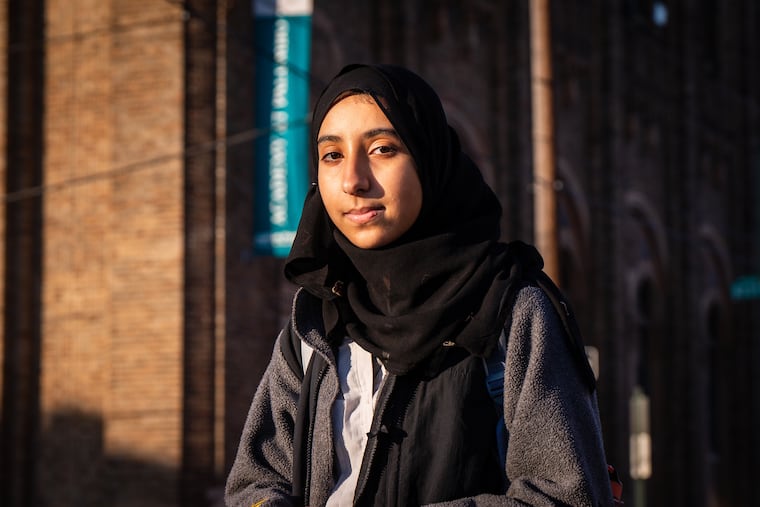Islamophobia in Philadelphia is on the rise
Calling all Muslims and Arabs terrorists is dangerous. I should not have to prove that I am a peaceful person.

I am 16 years old and I wear a hijab. Every year, when the anniversary of the attacks of Sept. 11, 2001, approaches, I feel guilty — or so my peers make me feel. It is nearly impossible to commemorate the date when all that fills my mind is fear of someone calling me a terrorist, or looking at me whenever the horrific event is being discussed in class. I even wonder, “Should I feel sorry for what has happened that day?”
But I shouldn’t. I did nothing — I wasn’t even born until 2007.
Even though there is a large Muslim community in Philadelphia, growing up here, I have still felt like an outsider. Yes, being surrounded by marginalized communities has made it easier to put on the hijab here compared with other parts of the country. However, barbaric and extremist stereotypes still linger. For part of middle school, I took off my hijab just to not have to deal with those painful comments.
In recent times, the deaths and terror occurring in the war in Gaza have, unfortunately, given me a renewed sense of precarity. I see people on the news and through social media who look like me getting killed on a daily basis. Nearly 20,000 Palestinians have died in this war, according to the Hamas-run Gaza Ministry of Health, including at least 6,000 children and 4,000 women.
In the heat of this conflict, Islamophobia is on the rise. The Council on American-Islamic Relations has tracked nearly triple the number of Islamophobic incidents nationwide in the two weeks after the Hamas attack in October compared with the same two-week period last year.
When I think about the dangers of Islamophobia, I think of the three Palestinian American college students — Tahseen Ali Ahmad, Kinnan Abdalhamid, and Hisham Awartani — who were shot last month in Burlington, Vt., by a white man with a handgun on a residential street. They were wearing keffiyeh, a traditional Palestinian scarf.
I remember, also, a 6-year-old boy, Wadea Al Fayoume, and his mother, Hanaan Shahin, who were stabbed dozens of times by their landlord in October because they were Muslim. Wadea did not survive, and his mother was unable to attend his funeral because she was seriously injured.
Calling all Muslims and Arabs terrorists has consequences. Conflating a peaceful religion with terrorism is dangerous. Putting on the hijab shouldn’t feel like an act of bravery. Having conversations with my friends and family about being stereotyped and feeling uncomfortable and unsafe at times should not be common.
I should not have to prove that I am a peaceful person.
When I think of military actions meant to target terrorists, I can’t help but think of a school shooter in a building. Must we bomb the entire school to shreds to get rid of the perpetrator who is holding the children’s lives at stake? Should we strip the humanity of innocent lives who have no power? If this does not apply in your book of morals, then why must the line be crossed when it comes to Arabs or Muslims?
In my history classes, I have heard that the U.S. invasions of Afghanistan and Iraq were meant to gain justice for the world by eliminating terrorist groups. But if that is the case, then why are we bringing complete destruction to innocent lives and making their “normal” consist of hearing bombs being dropped over their roofs and performing routine Janazah prayers, or funeral prayers, to honor yet another life that has been taken, all because they are considered collateral damage?
Every life matters, but why does that not apply to the humanity of Arabs?
The FBI defines international terrorism as “Violent, criminal acts committed by individuals and/or groups who are inspired by, or associated with, designated foreign terrorist organizations or nations (state-sponsored).”
Yet I cannot help but feel — based on my personal experience as an Arab Muslim in Philadelphia — that the term terrorist has shifted to mean anyone who is Arab or Muslim. We have been stereotyped, targeted, and mischaracterized in the media. Horrific hate crimes will continue to rise until our country acknowledges and challenges its inner Islamophobia.
As a student, I believe that change starts with education. Philadelphia’s public school system needs to incorporate a curriculum that allows us to unlearn the hate toward Arabs and Muslims and celebrate our significance within our diverse communities.
City officials should also use their platforms to uplift organizations — such as the Philadelphia chapter of the Council on American-Islamic Relations and the Philly Palestine Coalition — that have been aiding and supporting my people’s advancement.
Doha Gassem is a junior at the Academy at Palumbo High School in Philadelphia.